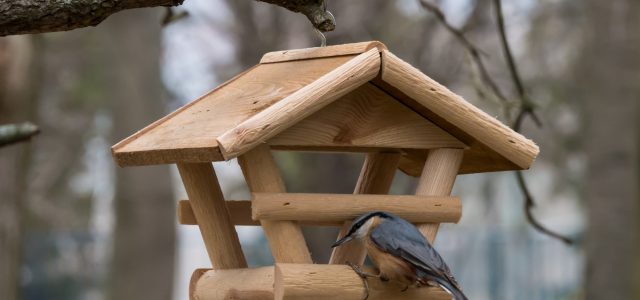
TOP TIPS TO PROTECT GARDEN BIRDS
As the cold weather advances, spare a thought for the garden birds which struggle to find food during this time of year
This month the Royal Society for the Protection of Birds suggests 10 easy tips to help protect wildlife during the winter months – including making wildlife friendly food and leaving out kitchen scraps.
These simple guidelines can improve garden birds’ chances of survival through the tough winter.
Chris Collett from the RSPB in Northern England says: “Up until now birds have been able to feed on insects and seeds, but the cold weather means they move into our gardens to find refuge.”
MAKE IT FULL FAT:
Birds need high-energy foods such as suet balls or cakes during the cold weather to maintain their fat reserves to survive the frosty nights. These are excellent winter foods and can be bought or homemade with lard or suet as a fun children’s activity.
TOP SEED:
Sunflower seeds are also high in fat – the oil content is higher in black than striped ones, so they are much better. Avoid bird food mixtures with wheat, barley grains, split peas, beans, dried rice or lentils. These are added to cheaper seed mixes to bulk them up.
SAVE NATURE:
Keep an eye out for the ‘Fair to Nature’ label – any seeds which have this label are grown by farmers who put aside at least 10 per cent of land for wildlife conservation.
GO NUTS:
Siskins, tits and nuthatches love peanuts but make sure they’re fed from a stainless-steel mesh feeder. This will help stop squirrels and woodpeckers from destroying the feeder to get to the nuts! Never give dry roasted or salted nuts.
SPARE SOME SCRAPS:
You don’t have to buy food in specially. Kitchen scraps like mild grated cheese, old fruit, cooked rice, unsalted bits of fat, roast potatoes and raw porridge oats will all be gratefully received. Dried fruits are particularly enjoyed but put them out of reach from dogs and cats.
HIDE IN A HEDGE:
Providing shelter from the weather is important. Plant dense hedges such as wild privet and you’ll be providing a great place to roost in and shelter from the elements. Ivy, holly and hawthorn will also give a great source of winter berries.
NO THANK YOU:
There are some foods you should avoid. Cooking fat from a roast, dried coconut, cooked porridge oats, milk, mouldy or salted food.
FRESH IS BEST:
Finding sources of water can be hard with freezing temperatures. Floating a small ball, such as a ping-pong ball, on the surface of water will stop it from freezing over.
WARMTH IS KEY:
Nestboxes are not just used over the egg-laying season – birds will use them on a cold winter’s night. These boxes are frequently communal with many packing in for extra warmth. The record number of birds found in one box is 63 wrens!
Ensuring your garden is filled with food will improve your chances of having a successful Big Garden Birdwatch, which runs from Saturday 26th to Monday 28th January 2019.
For information go to: rspb.org.uk/birdwatch

